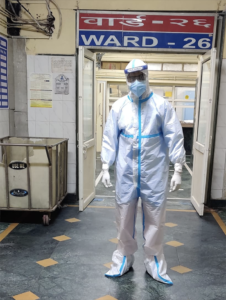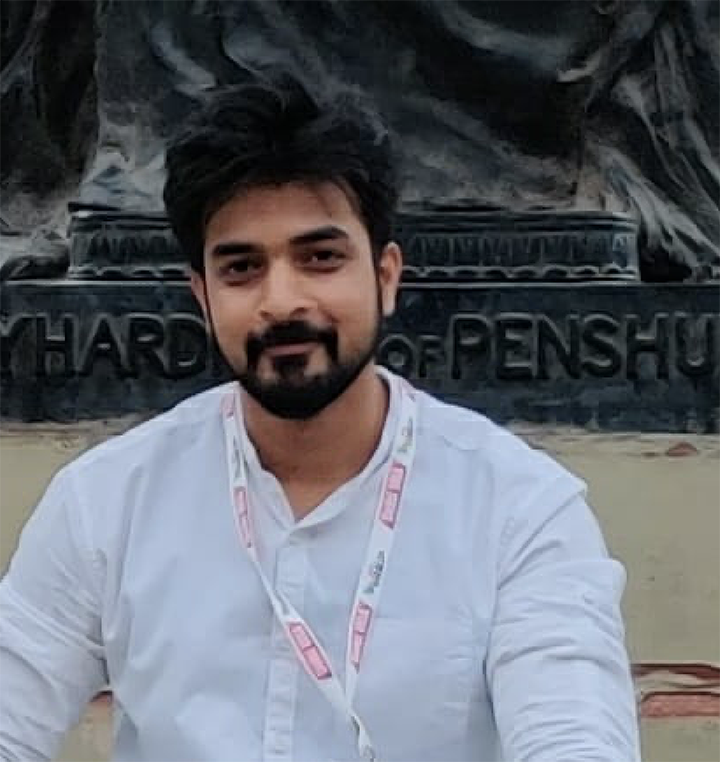A young medico shares his experience of working in LNJP’s Covid-19 ward, where new skills have to be learnt and new ways of working devised amid the world’s worst public health crisis in a century
In 2018, I came to Delhi to pursue my specialisation in radiology from Lok Nayak Jai Prakash (LNJP) Hospital. This January, I started compiling my thesis and our academic sessions were going fine – until the pandemic hit Delhi.
March 15 onwards things changed. The lockdown happened thereafter and we discontinued whatever academic work we were doing at that time. There were no Covid-19 patients in LNJP till end-March. During that time, the administration started preparing us to handle Covid patients by conducting seminars in every department.
We were given training – how to use PPE kits, how to take samples from Covid patients, how to avoid being infected – because it was certain that in no time our hospital would deal with Covid-19 patients too.
Initially, there were not too many patients. During that period, doctors who are from departments like anesthesia, medicine (among others) used to take over, and deal with Covid-19 patients mostly. We, from the radiology department, were supposed to do CT scans, prepare reports, among other duties. But after some time, the situation worsened and more and more patients started pouring in.
LNJP turned into a dedicated Covid-19 hospital, and they started assigning duties to all resident doctors in Covid wards. So all shifts were given in those wards and other patients (not infected with Covid-19) stopped coming in. The whole equation changed.
Our shifts in Covid wards are 12 hours per day, then a 24-hour gap, and again the shift begins. This goes on for 14 days. After that, we need to be in quarantine for one week — which was earlier two weeks. They minimised it due to shortage of staff. Also, we are tested after every 14 days and we get our Covid-19 test results during our quarantine. In this way, we can resume duty without any problem.
Initially, we faced discomfort while working with a PPE suit on, and that happened because we were not used to it. It was very tough – it gets very suffocating and sweaty. Also, we wear 2-3 pairs of gloves to protect ourselves. I dealt with my fears also, as I was in close contact with Covid-19 patients. With time, I started getting used to it and could even tolerate wearing a PPE suit for 5-6 hours. The anxiety subsided as well.

Coordination was a task initially. Once we got into PPEs, we weren’t allowed to take phones with us. So if I was on one floor and my colleague – whose assistance I need – is on the other, it was difficult to communicate. We managed by keeping one phone on the top floor (where patients were handled) – to convey messages to those who were working on the other floor (handling other work like documenting patients’ details).
Some patients have emotional breakdowns, as they are away from their family and aren’t able to contact them while in the hospital. I myself got emotional while witnessing such incidents. I would like to share one such incident, which I remember vividly.
A woman, around 70 years, was kept on oxygen support. I was checking her blood pressure once when she handed me a few papers. She was trying to tell me something. But I couldn’t understand much of what she was saying, as it’s tough to hear while wearing a PPE. She was immensely sick, so she wasn’t able to convey as well.
I saw the paper – it had few numbers written on it. She pointed towards her bag, where I found a phone which was switched off. I realised she probably wanted to talk to someone. Her expression was one of helplessness, so I did somehow manage to get a phone and made her talk to her family. She was happy.
It gets mentally traumatising for patients who are away from family. And we can feel that emotional air in the wards too. But now, the government has kept tablets to be used for video calls with family in the Covid wards. So things are better now.
Being doctors, we are acquainted with death from early on. So that was something I was okay with. But what affected me was when we tried our best to cure a patient but failed to save him/her. Initially we were not aware of the disease’s course, so we witnessed sudden deaths. On days when we witness too many deaths, I feel disheartened.
Also, we doctors are away from our family too. The risk of infection is too high, so we have to stay away – even those who have homes in Delhi. So I have not gone home (my hometown is in Madhya Pradesh) and there’s no plan to visit anytime soon. My grandmother is aged, and diabetic as well, so won’t take that risk. Also, tests are often not reliable. The first Covid-19 test of a person might come negative but that person might be infected. And his second test may come positive. So it’s not safe.
At the outset, I hid from my family that I have been given duty in the Covid ward. But after one or two days, when I myself got accustomed to it, I informed them. My family got scared, but then I explained everything and then gradually they accepted it and showed their support.
To keep myself positive amid these trying times, I read books, watch videos on YouTube and talk to my family members and close friends over the phone. Also, we college mates and friends are living together in the hotel designated for quarantine and while on duty. We go for shifts together, and quarantine together. That’s a big support.
Dr Shubham Khatod, 25, is pursuing PG in radiology from Lok Nayak Jay Prakash Hospital (LNJP), Delhi
As told to Shruti Das





